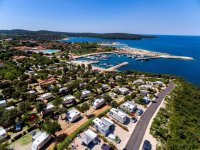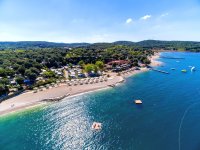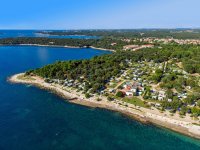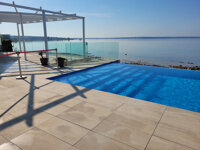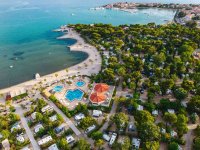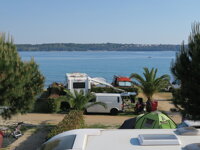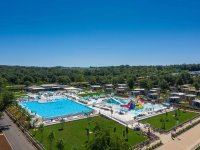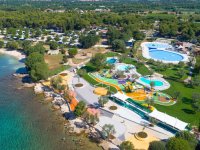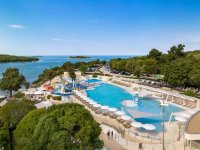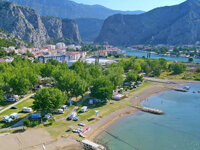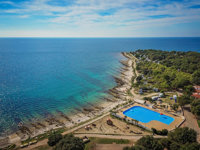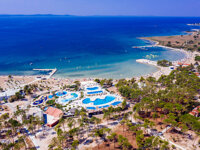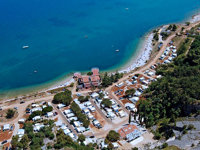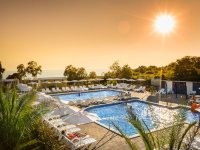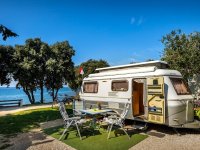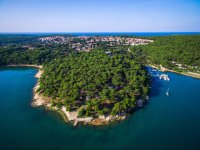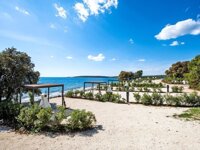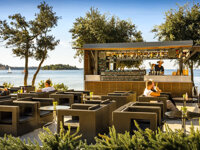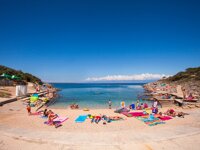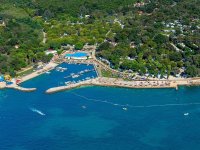Camping in Croatia
99 campsites in Croatia
Campsite Listing Google Map
The following consent is required:
Tracking & performance, Targeting & advertising.
Croatia
In recent years, Croatia has become one of the most fashionable places to visit in Europe. Yet, it has retained its identity as an unspoilt location free from the large-scale development and commercialisation other destinations have suffered. As such, camping in Croatia is a desirable option, with much to offer couples and families alike.
With its plethora of islands, Croatia has plenty of tranquil spots even during the high season. Get off the beaten track and discover small fishing villages and the rich vegetation that's home to a variety of wildlife. Nature lovers will find camping in Croatia irresistible, thanks to its many national parks, which offer diverse environments teeming with flora and fauna. One of the most celebrated is Plitvice, which is set in the karst area of central Croatia and features lakes arranged in cascades that change colour depending on the balance of minerals and organisms in the water.
The heart-shaped peninsula of Istria, located in the north, is among the most developed tourist regions in Croatia. Here you can visit the preserved Roman amphitheatre in Pula, the beautiful town of Rovinj with its cobbled streets and wooded hills, and the resort of Umag, well known for its recreational activities, most notably tennis. Islands are studded all around the coast, making it ideal for sailing and diving enthusiasts.
Although Croatia's main attraction for many is Dubrovnik, the city of Split is not to be missed. It features Emperor Diocletian's palace, an impressive building constructed in the fourth century AD and enormously significant as the world's most complete remains of a Roman palace. The city is also home to several museums and galleries, as well as being a centre for sports. From here the islands of Brac, Hvar, Vis and Korcula, renowned for their lively fishing villages and pristine beaches, are easily accessible by ferry.
Unknown matrix block type: tableOfContents2!
Basic Information

Capital Zagreb
Currency Euro (EUR)
Language(s) Croatian
Time Zones CET (GMT+1)
Summer (DST) CEST (UTC+02)
Telephone Code +385
Units Metric
EU Member Yes
Schengen Area Yes
Tourism Websitecroatia.hr
Croatia is a member of the European Union, and customs inspections are occasionally conducted on individuals and vehicles crossing the border to ensure compliance with Croatian regulations.
Shopping in Croatia
Croatia is great for shopping as it has a variety of locally manufactured products, such as the tie worn by millions daily around the world. They are so proud of manufacturing this product that they have a national day to celebrate the connection. The small shops running through the alleyways of Dubrovnik, Zagreb, Split and some villages are great places to buy traditional crafts. Among the most typical products are toys carved in wood; glass is also one of the country’s most popular materials. The most prestigious glassware-producing area is Samobor, where you can find everything from kitchen utensils to crystal jewellery.
Croatia has a long craftsmanship tradition, including weaving and bobbing lace. Lepoglava, and some regions of the coast, have been dedicated to this craft. Therefore, in many small shops in large cities such as Zagreb, Dubrovnik and Split and surrounding villages, you can find various items, such as tablecloths and embroidered products. UNESCO protects the technique used in Lepoglava to braid the threads.
Umbrellas are the most popular accessory in the Zagreb region; the capital is full of shops with these items available. The Croatian umbrella maintains the ascetics of the original umbrellas that were made in the 18th century.
Shops and supermarkets are open from around 8am to 7 or 8pm, Monday to Friday. And usually until 2pm on Saturdays. No shops are open on Sundays.
During the peak tourist season, business hours change significantly.
Croatian Money
Croatia uses the euro as its official currency. It is advised to carry some cash, but ATMs are readily available in almost all resorts, towns and cities. Cash is no longer king in Norway, and almost all establishments now accept electronic payment by card or phone.
Croatian Public Holidays
- New Year's Day: January 1st
- Epiphany: January 6th
- Easter Sunday, Easter Monday
- Labour Day: May 1st
- National Day: May 30th
- Corpus Christie Day: June 8th
- Anti-Fascist Resistance Day: June 22nd
- Victor and Homeland Thanksgiving Day: August 5th
- Assumption Day: August 15th
- All Saints Day: November 1st
- Homeland War Victims Remembrance Day: November 18th
- Christmas Day: December 25th
- Saint Stephen's Day: December 26th
Please note Some dates are moveable, so please check before travelling.
Driving in Croatia

Visitors to Croatia who wish to drive in the country must comply with the following requirements:
- A valid driver's license: Visitors must have a valid driver's license from their home country.
- Car insurance: Visitors must have valid car insurance for their vehicle, covering both the driver and passengers.
- Vehicle registration: Visitors must have a valid vehicle registration for their car, which must be displayed on the vehicle.
- Road rules: Croatian traffic laws follow the right-hand side of the road. Overtake on the left. The use of seat belts is mandatory for all occupants of a vehicle. Driving with a dirty number plate can result in a fine. Visitors must follow Croatia's traffic laws, including speed limits, traffic signals, and road signs.
- Safety equipment: It is mandatory to carry a warning triangle, reflective vest, Headlamp beam deflectors and first aid kit.
- Minimum driving age: The minimum driving age in Croatia is 18 years old.
- Alcohol law: Croatia has a zero-tolerance policy for drivers.
- Camper vans and cars with caravans are not allowed to exceed 12 metres in length, 4 metres in height and 2.55 metres in width.
- Like many other European countries, Croatia has motorways and other highways with tolls. You can pay for them with cash or a credit card.
A pre-paid SMART card system exists for motorists, which provides a 10% discount on toll charges, although motorists must register beforehand to use this system. - Winter tires: From November to March, all vehicles must have winter tires when driving on certain roads.
Croatian Emergency Services
- European Emergency Number 112
- Police 192
- Fire department 193
- Ambulance 194
- Maritime search & rescue 195
- Help on the road 1987

Places of Interest
Dubrovnik: Particularly appealing is the old town Stari Grad, with marble-paved squares and steep, cobbled streets.
Risnjak and Paklencia National Parks: Both have excellent areas for hiking, the latter has excellent opportunities for rock climbing.
Rovinj: An active fishing port, an excellent collection of marine life can be found at the aquarium.
Split: Diocletian’s Palace, Maritime Museum.
Zagreb: The capital of Croatia, with a whole host of museums
Cuisine of the region
Croatian cuisine is a diverse mix of influences from the Mediterranean, Central Europe, and the Balkans. The country's long coastline means that seafood is a staple of the diet, while the interior regions are known for their hearty meat dishes.

Crni rižot (black risotto): This dish is made with cuttlefish or squid ink, which gives it its distinctive black colour and intense seafood flavour.
Pašticada: A traditional Croatian stew made with beef, prunes, and spices. It is typically served with njoki (dumplings).
Peka: A dish of meat, vegetables, and potatoes cooked under a bell-shaped lid in a wood-fired oven. It is a popular dish in Dalmatia, the coastal region of Croatia.
Buzara: A dish of mussels or clams cooked in a white wine sauce with garlic and parsley. It is typically served with bread to soak up the delicious sauce.
Pršut: A Croatian dry-cured ham that is similar to prosciutto. It is typically served as an appetizer or snack.
Cesnjovka: Garlic sausage.
Kulen: Paprika-flavoured salami.
Manistra od bobica: Beans and fresh maize soup.
Piroska: Cheese doughnut.
Struki: Baked cheese dumpling.
Croatian Climate
Croatia's climate is determined by its geography, characterised by a mixture of mountains, plains, forests and a long intertidal zone. Croatia is divided into two principal climate regions - Mediterranean and Continental.
CROATIA WEATHERThe peak summer months of July and August bring the best weather, with blissfully hot days and ideal water temperatures for swimming. Hvar Island gets the most sun hours, followed by Split, Korčula Island and Dubrovnik.
In May, June, September and October, you can expect pleasant sunny days ideal for swimming in the Adriatic Sea and sunbathing. It's also a perfect time for outdoor activities such as hiking, mountain biking, rafting and sea-kayaking. The steady north-westerly wind is great for sailing in spring and early summer.
Winters in continental Croatia are cold. Christmas brings a great atmosphere to Zagreb's streets, even with the snow, plus there's skiing too - many of the coastal attractions close down for winter.
